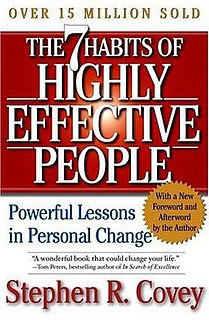 W
WThe 7 Habits of Highly Effective People, first published in 1989, is a business and self-help book written by Stephen R. Covey. Covey presents an approach to being effective in attaining goals by aligning oneself to what he calls "true north" principles based on a character ethic that he presents as universal and timeless.
 W
WThe Seven Habits of Highly Effective Teens is a 1998 bestselling self-help book written by Sean Covey, the son of Stephen Covey. The book was published on October 9, 1998 through Touchstone Books and is largely based on The Seven Habits of Highly Effective People. In 1999 Covey released a companion book entitled Daily Reflections For Highly Effective Teens.
 W
WAbraham Low Self-Help Systems (ALSHS) is a non-profit organization formed from the merger of Recovery International and the Abraham Low Institute. ALSHS facilitates the estimated 600 worldwide Recovery International meetings and all projects formerly run by the Abraham Low Institute including the Power to Change program. The organization is named after Abraham Low, founder of the mental health self-help organization now known as Recovery International.
 W
WApplied behavior analysis (ABA), also called behavioral engineering, is a scientific technique concerned with applying empirical approaches based upon the principles of respondent and operant conditioning to change behavior of social significance. It is the applied form of behavior analysis; the other two forms are radical behaviorism and the experimental analysis of behavior.
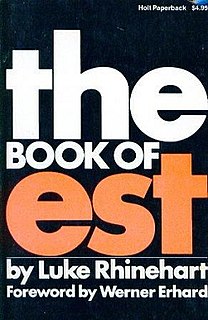 W
WThe Book of est is a fictional account of the training created by Werner Erhard, (est), or Erhard Seminars Training, first published in 1976 by Holt, Rinehart and Winston. The book was written by est graduate Luke Rhinehart. Rhinehart is the pen name of writer George Cockcroft. The book was endorsed by Erhard, and includes a foreword by him. Its contents attempts to replicate the experience of the est training, with the reader being put in the place of a participant in the course. The end of the book includes a comparison by the author between Erhard's methodologies to Zen, The Teachings of Don Juan by Carlos Castaneda, and to Rhinehart's own views from The Dice Man.
 W
WCommon Purpose is a British-founded charity that runs leadership development programmes around the world.
 W
WDrug addiction recovery groups are voluntary associations of people who share a common desire to overcome their drug addiction. Different groups use different methods, ranging from completely secular to explicitly spiritual. Some programs may advocate a reduction in the use of illegal drugs rather than outright abstention, although this is for other programs typically not a sustainable treatment plan in the long term. One survey of members who found active involvement in any addiction recovery group correlates with higher chances of maintaining sobriety. The survey found group participation increased when the individual members' beliefs matched those of their primary support group. Analysis of the survey results found a significant positive correlation between the religiosity of members and their participation in twelve-step programs and to a lesser level in non religious SMART Recovery groups, the correlation factor being three times smaller for SMART Recovery than for the twelve-step addiction recovery groups. Religiosity was inversely related to participation in Secular Organizations for Sobriety.
 W
WEnvironmental enrichment is the stimulation of the brain by its physical and social surroundings. Brains in richer, more stimulating environments have higher rates of synaptogenesis and more complex dendrite arbors, leading to increased brain activity. This effect takes place primarily during neurodevelopment, but also during adulthood to a lesser degree. With extra synapses there is also increased synapse activity, leading to an increased size and number of glial energy-support cells. Environmental enrichment also enhances capillary vasculation, providing the neurons and glial cells with extra energy. The neuropil expands, thickening the cortex. Research on rodent brains suggests that environmental enrichment may also lead to an increased rate of neurogenesis.
 W
WERG theory is a theory in psychology proposed by Clayton Alderfer.
 W
WThe Esalen Institute, commonly called Esalen, is a non-profit American retreat center and intentional community in Big Sur, California, which focuses on humanistic alternative education. The institute played a key role in the Human Potential Movement beginning in the 1960s. Its innovative use of encounter groups, a focus on the mind-body connection, and their ongoing experimentation in personal awareness introduced many ideas that later became mainstream.
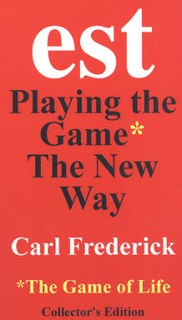 W
West: Playing the Game the New Way is a non-fiction book by Carl Frederick, first published in 1976, by Delacorte Press, New York. The book describes in words the basic message of Werner Erhard's Erhard Seminars Training (est) theatrical experience. Erhard/est sued in federal court in the United States to stop the book from publication, but the suit failed. The book takes a 'trainer's' approach to the est experience, in that it essentially duplicates the est training, citing examples and using jargon from the actual experience.
 W
WFirst Things First (1994) is a self-help book written by Stephen Covey, A. Roger Merrill, and Rebecca R. Merrill. It offers a time management approach that, if established as a habit, is intended to help readers achieve "effectiveness" by aligning themselves to "First Things". The approach is a further development of the approach popularized in Covey's The Seven Habits of Highly Effective People and other titles.
 W
WThe Fourth Way enneagram is a figure published in 1949 in In Search of the Miraculous by P.D. Ouspensky, and an integral part of the Fourth Way esoteric system associated with George Gurdjieff. The term "enneagram" derives from two Greek words, ennea (nine) and gramma, and was coined by Gurdjieff in the period before the 1940s.
 W
WIn psychology, frustration is a common emotional response to opposition, related to anger, annoyance and disappointment. Frustration arises from the perceived resistance to the fulfillment of an individual's will or goal and is likely to increase when a will or goal is denied or blocked. There are two types of frustration: internal and external. Internal frustration may arise from challenges in fulfilling personal goals, desires, instinctual drives and needs, or dealing with perceived deficiencies, such as a lack of confidence or fear of social situations. Conflict, such as when one has competing goals that interfere with one another, can also be an internal source of frustration or annoyance and can create cognitive dissonance. External causes of frustration involve conditions outside an individual's control, such as a physical roadblock, a difficult task, or the perception of wasting time. There are multiple ways individuals cope with frustration such as passive–aggressive behavior, anger, or violence, although frustration may also propel positive processes via enhanced effort and strive. This broad range of potential outcomes makes it difficult to identify the original cause(s) of frustration, as the responses may be indirect. However, a more direct and common response is a propensity towards aggression.
 W
WGetting Things Done (GTD) is a personal productivity system developed by David Allen and published in a book of the same name. Described as a time management system, the author states in the book that if a task is on one's mind, it will fill one's mind completely, which guarantees that one will be incapable of handling yet another task; therefore one will fail to complete any of them.
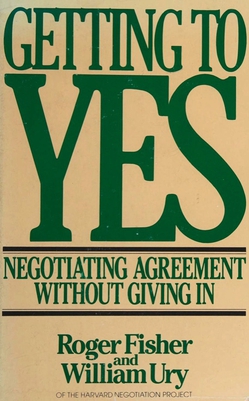 W
WGetting to Yes: Negotiating Agreement Without Giving In is a best-selling 1981 non-fiction book by Roger Fisher and William L. Ury. Subsequent editions in 1991 and 2011 added Bruce Patton as co-author. All of the authors were members of the Harvard Negotiation Project. The book made appearances for years on the Business Week bestseller list. The book suggests a method called principled negotiation or "negotiation of merits".
 W
WThe Hipster PDA is a paper-based personal organizer, popularized by Merlin Mann. Originally a tongue-in-cheek reaction to the increasing expense and complexity of personal digital assistants (PDA), the Hipster PDA simply comprises a sheaf of index cards held together with a binder clip. Following widespread coverage in the media and blogs, the hPDA has become a popular personal management tool particularly with followers of David Allen's Getting Things Done methodology.
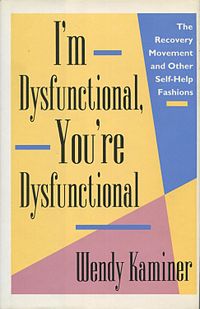 W
WI'm Dysfunctional, You're Dysfunctional: The Recovery Movement and Other Self-Help Fashions is a non-fiction book about the self-help industry, written by Wendy Kaminer. The book was first published in a hardcover format in 1992 by Addison-Wesley, and again in a paperback format in 1993, by Vintage Books.
 W
WThe Leadership Challenge is a suite of books, training products and assessments based on the book written by James Kouzes and Barry Z. Posner, published by Wiley. First published in 1987, the book's sixth edition was released in 2017.
 W
WLoserthink: How Untrained Brains Are Ruining America is a 2019 nonfiction book by Scott Adams, creator of Dilbert. Adams suggests that many otherwise intelligent people are trapped by unproductive ways of thinking. The reason for this, he says, is they don't have experience across multiple domains and thus are not equipped to think more productively. Loserthink introduces readers to the most useful thought patterns in a variety of disciplines. Adams wants to help employees identify mental barriers and how to break through them, as well as escape from their own "mental prisons." Loserthink is a New York Times Bestseller.
 W
WThe Jed Foundation (JED) is a non-profit organization that protects emotional health and prevents suicide for teens and young adults in the United States.
 W
WMajor Decisions: Taking Charge of Your College Education, published in 2010, is a self-help book written by Henry J. Eyring. The intended purpose of the book is to help both current and prospective college students get the most out of their college experience. “Probably the most important thing I’ve learned about higher education is this: you can get everything you hope for—and more—if you take personal responsibility for the design and construction of your education. The key is to be your own ‘general contractor,’ the one who puts all of the pieces of a higher education together according to a careful personal plan.”
 W
WMaslow's hierarchy of needs is an idea in psychology proposed by American Abraham Maslow in his 1943 paper "A Theory of Human Motivation" in the journal Psychological Review. Maslow subsequently extended the idea to include his observations of humans' innate curiosity. His theories parallel many other theories of human developmental psychology, some of which focus on describing the stages of growth in humans. He then created a classification system which reflected the universal needs of society as its base and then proceeding to more acquired emotions. His theories, including the hierarchy, may have been influenced by teachings and philosophy of the Blackfeet tribe, where he spent several weeks prior to writing his influential paper. The hierarchy of needs is split between deficiency needs and growth needs. The theory is usually shown as a triangle in illustrations.
 W
WMeditation is a practice where an individual uses a technique – such as mindfulness, or focusing the mind on a particular object, thought, or activity – to train attention and awareness, and achieve a mentally clear and emotionally calm and stable state.
 W
WThe Muhammad Ali Center is a non-profit museum and cultural center dedicated to boxer Muhammad Ali in Louisville, Kentucky. Ali, a native of Louisville, and his wife Lonnie Ali founded the museum in 2005.
 W
WThe Open University (OU) is a public research university and the largest university in the UK by number of students. The majority of the OU's undergraduate students are based in the United Kingdom and principally study off-campus; many of its courses can also be studied anywhere in the world. There are also a number of full-time postgraduate research students based on the 48-hectare university campus in Milton Keynes, where they use the OU facilities for research, as well as more than 1,000 members of academic and research staff and over 2,500 administrative, operational and support staff.
 W
WOutrageous Betrayal: The Dark Journey of Werner Erhard from est to Exile is a non-fiction book written by freelance journalist Steven Pressman and first published in 1993 by St. Martin's Press. The book gives an account of Werner Erhard's early life as Jack Rosenberg, his exploration of various forms of self-help techniques, and his foundation of Erhard Seminars Training "est" and later of Werner Erhard and Associates and of the est successor course, "The Forum". Pressman details the rapid financial success Erhard had with these companies, as well as controversies relating to litigation involving former participants in his courses. The work concludes by going over the impact of a March 3, 1991 60 Minutes broadcast on CBS where members of Erhard's family made allegations against him, and Erhard's decision to leave the United States.
 W
WThe Pomodoro Technique is a time management method developed by Francesco Cirillo in the late 1980s. It uses a timer to break work into intervals, traditionally 25 minutes in length, separated by short breaks. Each interval is known as a pomodoro, from the Italian word for 'tomato', after the tomato-shaped kitchen timer Cirillo used as a university student.
 W
WPsycho-Cybernetics is a self-help book written by Maxwell Maltz in 1960. Motivational and self-help experts in personal development, including Zig Ziglar, Tony Robbins, Brian Tracy have based their techniques on Maxwell Maltz. Many of the psychological methods of training elite athletes are based on the concepts in Psycho-Cybernetics as well. The book combines the cognitive behavioral technique of teaching an individual how to regulate self-concept, using theories developed by Prescott Lecky, with the cybernetics of Norbert Wiener and John von Neumann. The book defines the mind-body connection as the core in succeeding in attaining personal goals.
 W
WQuiet Power: The Secret Strengths of Introverts is a 2016 non-fiction book written by Susan Cain with Gregory Mone and Erica Moroz, and illustrated by Grant Snider.
 W
WQuiet: The Power of Introverts in a World That Can't Stop Talking is a 2012 non-fiction book written by Susan Cain. Cain argues that modern Western culture misunderstands and undervalues the traits and capabilities of introverted people, leading to "a colossal waste of talent, energy, and happiness".
 W
WThe Scary Guy is a United Kingdom-based American motivational speaker who campaigns worldwide to eliminate hate, violence, prejudice, and bullying in schools and corporations. In addition to being a tattoo shop owner, comic, entertainer, inspirational speaker, and performance artist, The Scary Guy has pierced nose, eyebrows, and ears and covers over 85 percent of his body with tattoos.
 W
WSelf-cultivation or personal cultivation is the development of one's mind or capacities through one's own efforts. Self-cultivation is the cultivation, integration and coordination of mind and body. Although self-cultivation may be practiced as a form of psychotherapy, it goes beyond healing and self-help to also encompass self-development and self-improvement. It is associated with attempts to go beyond normal states of being, and enhancing and endless polishing of a person's capacities and the development of innate human potential.
 W
WSelf-help or self-improvement is a self-guided improvement—economically, intellectually, or emotionally—often with a substantial psychological basis.
 W
WThe Strong Interest Inventory (SII) is an interest inventory used in career assessment. As such, career assessments may be used in career counseling. The goal of this assessment is to give insight into a person's interests, so that they may have less difficulty in deciding on an appropriate career choice for themselves. It is also frequently used for educational guidance as one of the most popular career assessment tools. The test was developed in 1927 by psychologist Edward Kellog Strong, Jr. to help people exiting the military find suitable jobs. It was revised later by Jo-Ida Hansen and David P. Campbell. The modern version of 2004 is based on the Holland Codes typology of psychologist John L. Holland. The Strong is designed for high school students, college students, and adults, and was found to be at about the ninth-grade reading level.
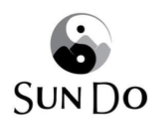 W
WSundo - also known as Kouk Sun Do (국선도) - is a Korean Taoist art based on meditation, and which aims at the personal development of its practitioners, both at the physical, mental and spiritual levels.
 W
WWaking up early is rising before most others and has also been described as a productivity method - rising early and consistently so as to be able to accomplish more during the day. This method has been recommended since antiquity and is now recommended by a number of personal development gurus. The philosopher Aristotle said, "It is well to be up before daybreak, for such habits contribute to health, wealth, and wisdom."
 W
WThe Way of Zen is a 1957 non-fiction book on Zen Buddhism and Eastern philosophy by philosopher and religious scholar Alan Watts. It was a bestseller and played a major role in introducing Buddhism to a mostly young, Western audience.
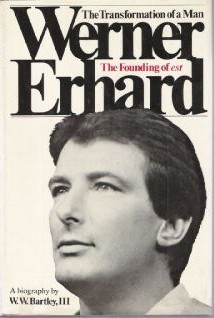 W
WWerner Erhard: The Transformation of a Man, The Founding of est is a biography of Werner Erhard by philosophy professor William Warren Bartley, III. The book was published in 1978 by Clarkson Potter. Bartley was professor of philosophy at California State University and had studied with philosopher Karl Popper. He was the author of several books on philosophy, including a biography about Ludwig Wittgenstein. Erhard wrote a foreword to the book. The book's structure describes Erhard's education, transformation, reconnection with his family, and the theories of the est training.
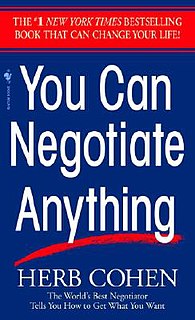 W
WYou Can Negotiate Anything is a self-help book on negotiation by Herb Cohen. Cohen used story-telling to help explain the various concepts and strategies behind the art of negotiation. The 1982 book spent nine months on the New York Times bestseller list.